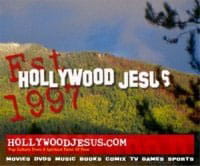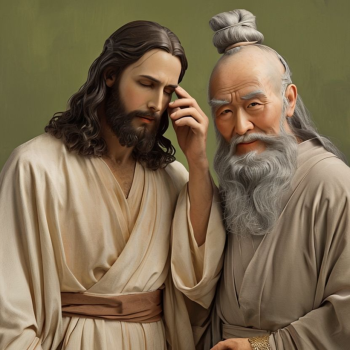Greg Wright is the managing editor of Hollywood Jesus, and the author of Tolkien in Perspective: Sifting the Gold from the Glitter and This Guilded Age. He has degrees in literature, computer science and theology, and he is an ordained minister in the dramatic arts.
For our Public Square discussion on movies and faith, he spoke with Timothy Dalrymple by phone.
Hollywood Jesus has been a successful Christian media website for years. How did it begin?
 The founder, David Bruce, has a background in broadcasting in radio and television. Back in 1997, while pastoring a church in California, he attended a Billy Graham leadership conference in San Francisco. At the conference, Billy Graham challenged those in attendance to do something with the internet. The internet then was the equivalent of Gutenberg's printing press, and everyone knows the first book printed on the press was the Bible. Graham observed that the internet at that time was used primarily for research and pornography, and it seemed like we were missing a pretty large boat here.
The founder, David Bruce, has a background in broadcasting in radio and television. Back in 1997, while pastoring a church in California, he attended a Billy Graham leadership conference in San Francisco. At the conference, Billy Graham challenged those in attendance to do something with the internet. The internet then was the equivalent of Gutenberg's printing press, and everyone knows the first book printed on the press was the Bible. Graham observed that the internet at that time was used primarily for research and pornography, and it seemed like we were missing a pretty large boat here.
Since David's background was in multimedia, and he had a particular interest in the film industry, he considered what he could do. He came up with this controversial and ear-catching idea of naming a website Hollywood Jesus.
This immediately became a lightning rod for both sides of the cultural divide. The liberal side couldn't imagine talking about Jesus in the context of Hollywood, and the conservative side couldn't imagine talking about Hollywood in the context of Jesus. So he set himself right square in the middle. Partly because of the name and partly because of David's unique approach to discussing the visual elements of film rather than producing a generic review with a bunch of words, he found himself with a website that became extraordinarily popular. And then when Lord of the Rings and The Passion of the Christ came along, the thing just exploded.
How did you come to be a part of Hollywood Jesus?
After a previous career, I took a degree through an adult education program at a Bible college. In the process of graduating, I was offered free magazine subscriptions. I found myself reading Christianity Today and Leadership Journal, and both did feature articles on Hollywood Jesus. I said to myself, "Hmm, this really sounds interesting. I better take a look."
So I got on the internet, which was pretty new to me in 1998, and looked at the website. I was impressed, but I thought the website needed an editor. Since I had just retired from my first career as a medical technologist, I had free time. I sent David an email and volunteered to be his personal editor. For a period of months I was doing that for him, and then he sent me an email saying, "Hey, there's this movie coming up that I think is going to be pretty popular. It's called The Lord of the Rings. Do you know anything about it?"
It so happened that I had written my undergraduate honors thesis on Tolkien's mythology. So I dusted off my honors thesis and rewrote it a bit from the Hollywood Jesus approach and rather unthinkingly published it.
It exploded. It went viral. Suddenly it was being translated into Swedish and Spanish, and I was getting attacked left and right for the absolutely ridiculous things I was saying. That launched into a five-year project of doing an incredibly intense and dense suite of webpages covering the books and the movies, with interviews with actors and directors. It was pretty phenomenal. Since The Lord of the Rings was so wildly successful, it was a timely collaboration.
Few websites that launched in 1997 are still in operation, yet Hollywood Jesus persists. How do you explain that?
It's true that many sites that used to be our peers have come and gone and basically disappeared, but Hollywood Jesus has persisted. It's odd because the site is designed to operate, as David Bruce describes it, out on the very periphery of the Christian solar system. If you consider the sun of the Christian solar system as the Church, Hollywood Jesus is way out past Pluto somewhere, where there are bodies that are trying to resist the gravitational pull of the Church and other bodies coming into the gravitational pull of the Church, trying to figure out if they want to be part of the solar system or not.




